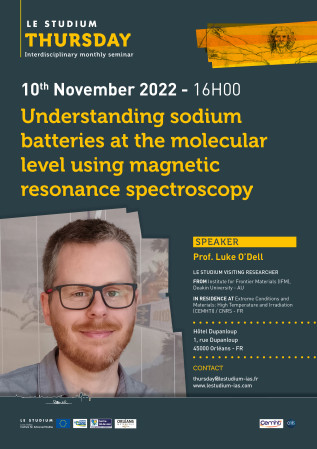Understanding sodium batteries at the molecular level using magnetic resonance spectroscopy
Hôtel Dupanloup
1 rue Dupanloup
45000 Orléans
France
Presentation
With the effects of climate change becoming increasingly apparent, the world is gradually transitioning away from harmful fossil fuels and towards greener and more renewable forms of energy such as wind and solar. Unfortunately, these energy sources are intermittent, and so energy storage technologies such as batteries will play an essential role in this transition. Lithium ion batteries in particular have been widely adopted, and are used to power everything from mobile phones to electric cars. However, lithium as a resource is not readily available and is becoming increasingly expensive.
In this project, we aim to develop new battery materials and chemistries that will allow us to replace lithium with a cheaper and more abundant element: sodium. In order to design these new systems, we first need to understand in detail how sodium ions exist within a battery, including how they interact with the other molecules and materials, how fast they move, and what reactions they are involved in. To achieve this, we are using an experimental technique called nuclear magnetic resonance (NMR) spectroscopy. This method can provide a rich variety of information on the sodium ions (as well as other elements) inside battery materials such as electrolytes, and even inside a battery as it is being charged or discharged. The CEMHTI laboratory in Orléans has some of the world’s leading NMR equipment and expertise, and we are collaborating on a long-term project to understand how novel sodium battery electrolytes (including polymers and ionic liquids made at Deakin University, Australia) function at the molecular level, and how we can improve them to create the next generation of safer, greener and more efficient sodium batteries.
Speaker
LE STUDIUM Visiting Researcher
FROM: Institute for Frontier Materials (IFM), Deakin University - AU
IN RESIDENCE AT: Extreme Conditions and Materials: High Temperature and Irradiation (CEMHTI) / CNRS - FR







